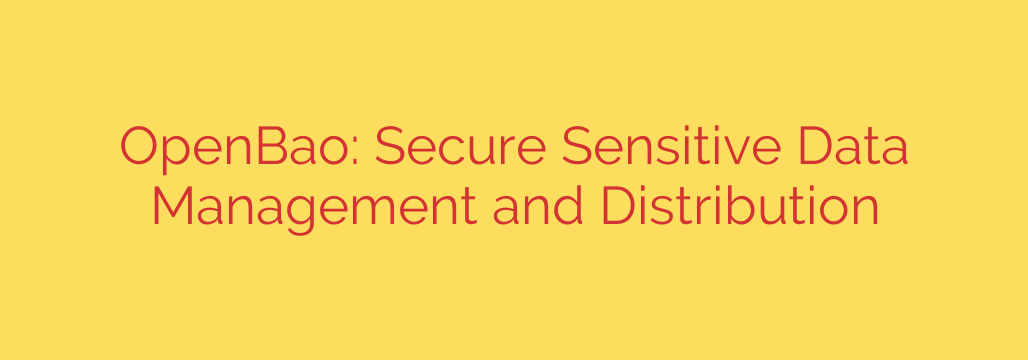
Securing Your Sensitive Data with OpenBao: A Deep Dive into the Open-Source Vault Alternative
In today’s complex digital landscape, managing sensitive data like API keys, passwords, and security certificates is one of the most critical challenges for any organization. Hardcoding credentials into applications is a major security risk, and ad-hoc solutions often fail to scale. This is where dedicated secrets management tools become essential, and a significant new player has just entered the field: OpenBao.
OpenBao is a powerful, open-source tool designed to secure, store, and tightly control access to sensitive information. For those familiar with the security ecosystem, its origins are notable: OpenBao is a community-driven fork of HashiCorp’s Vault, created to ensure a permanent, truly open-source future for this critical technology.
What is OpenBao and Why Was It Created?
At its core, OpenBao provides a centralized and secure “vault” for managing secrets. Instead of scattering credentials across configuration files, code repositories, or developer machines, organizations can store them in OpenBao and provide applications with secure, programmatic access.
The creation of OpenBao was a direct response to a shift in the open-source community. It was initiated by the Linux Foundation after HashiCorp transitioned Vault from the widely used Mozilla Public License (MPL 2.0) to the more restrictive Business Source License (BSL 1.1). This change raised concerns for many companies and developers who rely on a truly open-source model, free from commercial restrictions.
To preserve the open and collaborative nature of the project, a coalition of developers and companies launched OpenBao. The project is managed under the trusted governance of the Linux Foundation and maintains the original, permissive Mozilla Public License 2.0 (MPL 2.0). This ensures that OpenBao will remain free to use, modify, and distribute for any purpose, providing long-term stability and predictability for its users.
Key Features and Goals of OpenBao
While the project is new, its foundation is built on years of development from the original Vault codebase. OpenBao aims to provide the same robust functionality while prioritizing community governance and open collaboration.
Here are its primary goals:
- Robust Secrets Management: OpenBao securely handles a wide range of sensitive data, including tokens, passwords, certificates, and encryption keys. It provides a unified API to access secrets, along with features like dynamic secret generation and data encryption.
- Guaranteed Open-Source Licensing: By operating under the MPL 2.0 license, OpenBao commits to being a forever-free and open-source project. This is its core value proposition for users concerned about vendor lock-in or future licensing changes.
- Community-Driven Governance: Unlike a single-vendor project, OpenBao’s roadmap and development will be guided by a technical steering committee composed of diverse community members. This ensures the project evolves based on the needs of its users, not the commercial interests of one company.
- API Compatibility: A crucial goal for OpenBao is to maintain API compatibility with past open-source versions of HashiCorp Vault. This is designed to make migration as seamless as possible for existing users, potentially allowing them to switch with minimal changes to their infrastructure and workflows.
Who Should Consider Using OpenBao?
OpenBao is a compelling solution for a wide range of users, from individual developers to large enterprises. You should pay close attention to this project if you are:
- An existing HashiCorp Vault user concerned about the long-term implications of the BSL license.
- An organization with a strict “open-source only” policy for critical infrastructure.
- A developer or DevOps engineer looking for a free, powerful, and community-supported secrets management solution.
- A company building commercial products that require integrating a secrets management tool without restrictive licensing terms.
Practical Security Tips for Managing Secrets
Regardless of the tool you choose, implementing a strong secrets management strategy is non-negotiable. Here are a few actionable best practices:
- Centralize All Secrets: The first step is to eliminate secrets from your code, configuration files, and CI/CD logs. Use a centralized tool like OpenBao to store and manage them.
- Embrace the Principle of Least Privilege: Ensure that applications and users only have access to the specific secrets they absolutely need to function. Tightly control permissions and access policies.
- Audit and Rotate Credentials Regularly: Your secrets management tool should provide a clear audit trail of who accessed what and when. Implement automated policies to rotate passwords, tokens, and certificates frequently to reduce the window of opportunity for attackers.
- Use Dynamic Secrets: Instead of long-lived static credentials, use a system that can generate short-lived, on-demand secrets. This drastically minimizes the risk if a secret is ever exposed.
The launch of OpenBao marks a pivotal moment for the open-source security community. It represents a commitment to collaborative development and provides a stable, predictable, and powerful alternative for managing the most sensitive components of modern IT infrastructure. As the project grows, it is poised to become a foundational element in the security toolkit for organizations worldwide.
Source: https://www.linuxlinks.com/openbao-manage-store-distribute-sensitive-data/








